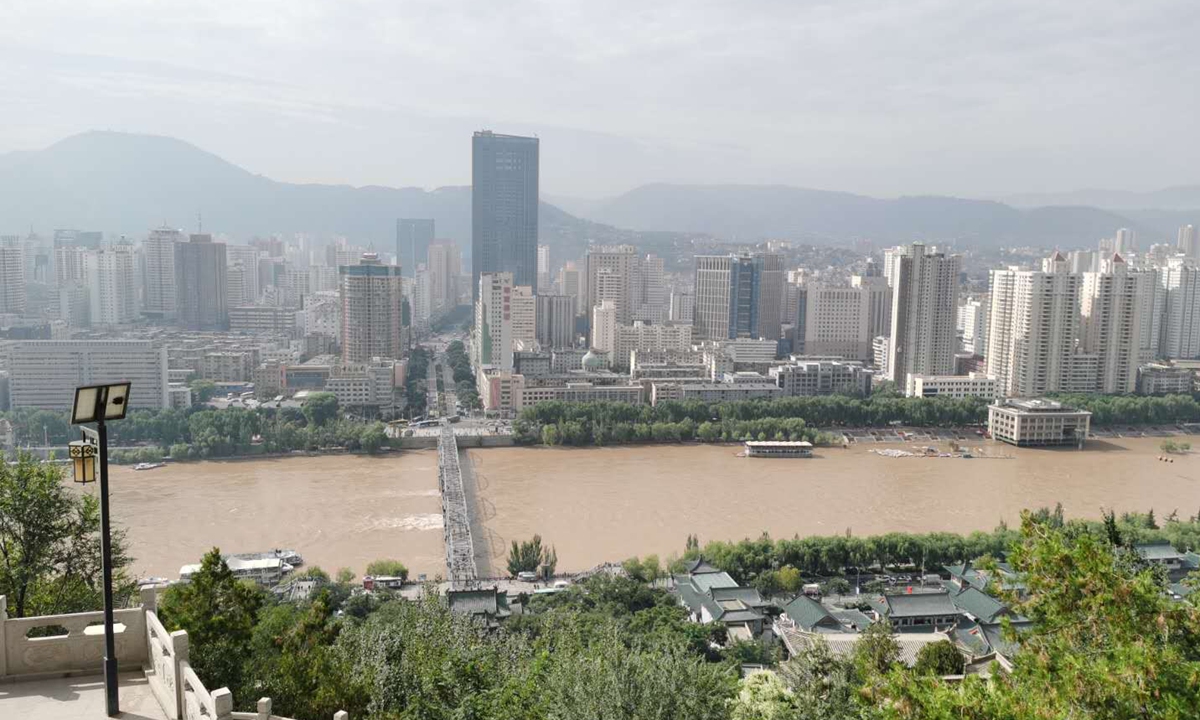China’s eco-efforts bear healthy social fruits in new environmental era

A view of Lanzhou, capital of Northwest China's Gansu Province. Photo: Lao Ma/GT
Recently, I went back to Lanzhou, capital of Northwest China's Gansu Province, where I studied years ago as a graduate, to give lectures, and I found the city to be breathtakingly beautiful. It is located at the center of China's geographical map with the Yellow River passing through it. One day, I looked far along the north bank of the Yellow River, and the scenery was no less than Budapest on the Danube.
The campus of my alma mater - Lanzhou University - was full of autumn hues. Beneath the blue sky and white clouds, the trees began to turn yellow, making the campus look like a perfect place to make a memorable photo for internet fame.
However, this is no longer the city I could recall. When I first came here from a well-watered town in southern China for college 23 years ago, the air was extremely terrible there. Residents in Lanzhou used to make fun that they inhaled at least two honeycomb briquettes during winter. The city was rated as one of the "most polluted cities in the world" by Western media. But now it is not on the list anymore.
The improvement of air quality in Lanzhou is just a microcosm of the changes in many cities across China. In the 2019 World Air Quality Report published by IQAir, a Swiss air quality technology company, China has fallen out of the top 10 in the national averages of PM2.5 concentration rankings.
Apart from the natural environment, Lanzhou's pollution mainly stemmed from policies of accelerated industrial output for economic growth. Twenty years ago, there were many heavy chemical enterprises in the city, and the local residents burned coal for heating in winter. But everything has changed now: Many heavily polluting factories have been shut down or renovated. Natural gas is used instead of coal for heating.
Tang Renjian, governor of Gansu, explained that in recent years, efforts have been made to improve the ecological environment in the province. All of the 346 ecological and environmental problems that were found in the Qilian Mountains by Gansu authorities in the past few years have been rectified by local governments. It can be seen that the Chinese people's determination to enhance ecological governance is firm and efficient.
The air pollution in Los Angeles, starting in 1903, lasted for 50 years before it was thoroughly curbed. It took London more than a decade to control the 1952 smog incident. China's pursuit of environmental protection, by contrast, has taken place at a much faster pace.
In recent years, in various cities in China, people often see slogans that use the word "war" to show courage, such as "air defense war," "soil remediation war," and "water quality compliance war," to eliminate the "enemies" who damage the good life of the Chinese people.
We have to admit that the "cost" of this war is huge. China's economic growth has declined from an average of 11 percent (2003-11) to an average of 6.5 percent (2012-19). But the benefits are quite worth it: the blue sky, daylight, green mountains and green water that are essential for longevity.
Chinese President Xi Jinping's famous remark that almost everyone in China can recite states: "Clear waters and green mountains are as valuable as mountains of gold and silver." This typically reflects the Chinese people's new understanding of the relationship between economy and ecology.
The battle for the balance between economy and ecology is not over. Now, the 14th Five-Year Plan (2021-25) for national economic and social development is in the making. All Chinese cities have put forward new goals. For example, through the creation of innovative production and living models, 11 cities including Shenzhen are mobilizing their residents to fully recycle daily waste. These efforts will eventually reach "zero waste" discharge, so as to realize a win-win recycling urban system that benefits resources, environment, economics, and society.
The term "zero waste" was first used by American chemist Paul Palmer in 1973. It was only in the 1990s that it was gradually accepted by Western society. At present, a handful of Western cities are committed to "zero waste." But China needs to catch up with this movement. What surprised the world the most was China's proposal in September to strive to achieve a peak of carbon dioxide emissions by 2030 and achieve "carbon neutrality" by 2060. This is far earlier than the targets set by European countries whose environmental protection is highly respected.
The goal of "carbon neutral before 2060" is a huge signal to determine the next step of China's development. This will have a significant impact on China's economic structure, energy use, air quality, and even geopolitics, global governance and the world order.
With my personal feelings of the changes in Lanzhou and the greater development goals of China, I wish to explain to foreign readers that we should look at China from the perspective of dynamics and development. China is changing every day, so new perspectives must regularly be updated when observing it.
The author is professor and executive dean of Chongyang Institute for Financial Studies at Renmin University of China. opinion@globaltimes.com.cn



